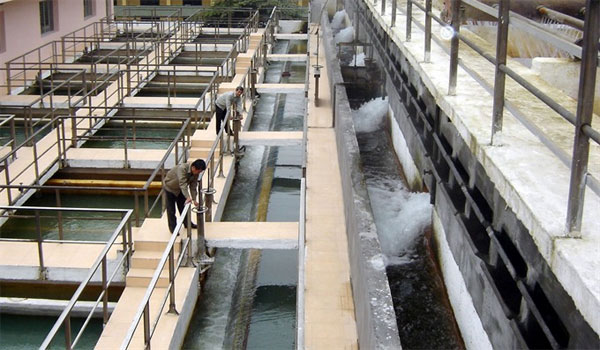Hanoi faces summer shortage of clean water
 |
| Processing water at the Ha Noi Clean Water Co, the main supplier of water to the capital city. |
This year, the situation does not look to be any better with provider companies expecting supply to fall short of demand by 70,000-100,000 cu.m every day, while many clean water projects are still in progress.
Early risers get the water
It’s only early summer, but houses in the Old Quarter of Ha Noi Hoan Kiem District are already stacking every water container imaginable - buckets, plastic barrels or basins.
Nguyen Thi Hoa living at 43 Hang Be Street, told the Kinh Te & Do Thi (Economics & Urban) newspaper that water shortage has been a familiar inconvenience for more than a decade now. Nguyen Duc Mien, a resident of the same street, said that judging from the situation at the beginning of this summer, things are looking grim.
Only during a few hours from midnight to early morning is tap water again available since water usage throughout the city decreases, so residents here have to either stay up really late or get up really early should they want to get some water.
“We really don’t expect a strong flow of water, we just want constant and sufficient water to get through the day, not having to do this exhausting routine anymore,” Mien said.
Similarly, many old apartment buildings in other main districts like Dong Da and Hai Ba Trung also are also struggling with a water dearth, which will just get progressively worse deeper into the summer rainy season.
Currently, water supply for the ever-expanding capital city is in the hands of four companies, Ha Noi Clean Water Co, Water Investment and Trading JSC (Viwaco), Ha Dong Clean Water Co, and Son Tay Clean Water Co. These four supply water for a total of 1,152,000 households, or 4.6 million people.
According to gathered data, the four companies’ combined output is estimated at 900,000 cu.m per day, with Ha Noi Clean Water’s output alone accounting for two thirds of this figure.
The municipal Department of Construction says that on particularly hot days, the demand for water rises by 12 per cent, which would translate to a deficiency of 70,000-100,000 cu.m of water on each such day. The pipeline system that transports water from the Da River to the capital city, which accounts for 23.4 per cent of the city’s total supply, suffered more than 20 ruptures in six years of operation. The system was tweaked to work at a less than designated capacity level, furthering limiting supply to the capital’s central area. The second pipeline was scheduled to become operational by the end of May 2016, but is seeing little progress.
Another water plant project that transports water from Duong River with a capacity of 300,000cu.m a day is still under construction and is expected to start operating in two years.
Proactive measures
2017 is expected to feature a longer summer and erratic climate conditions, causing unpredictable variations in hydrological regimes (the characteristics of a water body). Combined with slow regeneration of underground water, among others, this will make access to water in areas of elevated height or in downstream areas much harder.
For these reasons, the municipal Department of Construction has demanded that the four suppliers craft a viable water supply plan for the summer of 2017.
In order to ensure water supply for the central urban area and parts of the outlying districts, Nguyen Bao Vinh, Director of Ha Noi Clean Water Co., said the company has already implemented co-operation schemes with other suppliers, carried out rotating water supply schedules to make sure no areas are deprived of water for too long. In cases of local shortages, the company has prepared a fleet of water trucks, with higher priority placed on hospitals, schools, armed forces, and residential apartment buildings.
“Our hotline will be operational around the clock to receive reports on water supply interruptions as well as water quality to make timely responses,” Vinh said.
Hoang Van Thang, director of the Ha Dong Clean Water Co, said in order to ensure supply to its 140,000 customers, the company has upgraded or replaced a number of old underground pipelines which are prone to ruptures.
All water suppliers said they would try their best to meet the rising demand for water. However, “unplanned incidents regarding the infrastructure caused by extreme weather” could still occur, and in those cases, they pledged emergency protocols are in place to provide sufficient water to residents.
Customers are also urged to be wise and conservative in using water, which would reduce chances of their water supply being interrupted.

